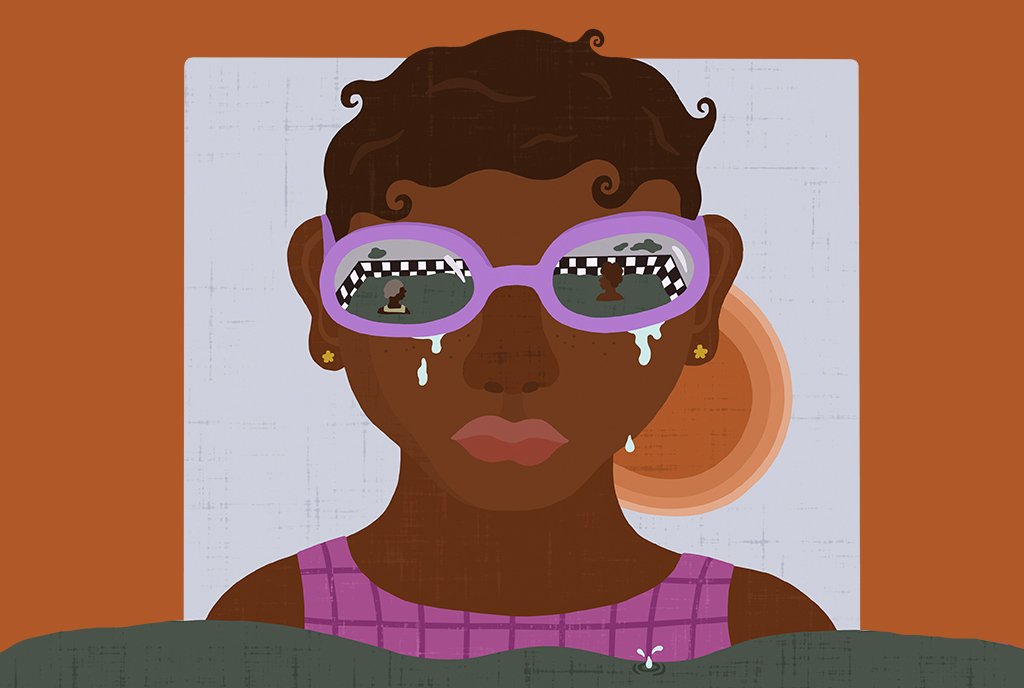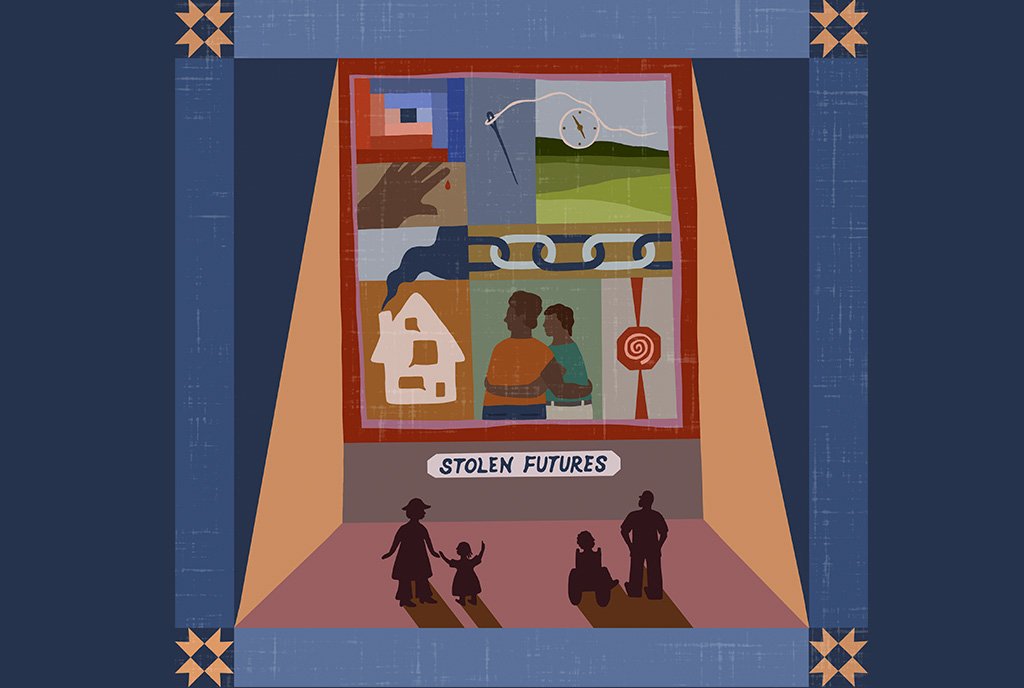
This article is the first in a three-part series, Quiet Violence: How the Tax System Works Against Black Americans, co-produced by The Maven Collaborative and NPQ. This series explores how the taxation system’s “quiet violence” enacted against Black Americans leads not only to financial inequality but also to stolen legacies, futures, peace, and health—and presents solutions for equitable change.
Most Americans view taxes as a necessary burden—a cost of living in a well-functioning society. We understand that taxes fund essential public services like education, infrastructure, and social safety nets, contributing to economic stability and the overall wellbeing of the nation.
Yet, beneath this veneer of impartiality, lies a harsh reality: The tax system, like so many systems in the United States, has a long and insidious history of disproportionately targeting, scapegoating, and punishing Black people for simply existing. This “quiet violence” is a pervasive, often overlooked assault that perpetuates economic inequality and undermines people’s wellbeing.
How We Got Here
The roots of this quiet violence run deep, back to the era of slavery. In US history, tax policies have served as a primary tool for cementing power for wealthy White elites. Taxes on slavery profits funneled billions of dollars back into US society, while wealthy enslavers used their power to impose constitutional limits on taxation to prevent non-slaveholders from using taxes to undermine or potentially abolish slavery.
Following emancipation, special taxes imposed on freed Black people were deliberately designed to oppress them, preventing them from accumulating wealth. State poll taxes were used to disenfranchise Black voters and keep them living a hand-to-mouth existence. In Mississippi, poll taxes were even used to arrest Black men and force them back into plantation labor if they were in arrears.
The US tax system has a long and insidious history of disproportionately targeting, scapegoating, and punishing Black people for simply existing.
The Jim Crow era saw the rise of property taxes as a tool for undermining Black land ownership and wealth accumulation. Exorbitant property taxes and discriminatory practices made it difficult for Black people to obtain and hold onto properties and land. Local tax assessors, often supported by White elites, shifted tax burdens onto Black people—and when families fell behind on their taxes, land could be quietly auctioned off without their knowledge.
Between 1910 and 2017, Black Americans had nearly 11 million acres of land confiscated, primarily through systemic violence, deceit, and exploitation, often facilitated through the tax system. Economist Dania Francis notes that during the 20th century, Black farmers were stripped of land worth nearly $326 billion.
Meanwhile, the infamous “Black codes” were used to weaponize tax laws to effectively force freed men and women back into a state of near slavery, by restricting their rights to own property and engage in certain jobs. White elites imposed heavy licensing fees on Black-owned businesses, while exorbitant wage taxes trapped freed Black workers into cycles of debt.
The Taxpayer Myth
To fully comprehend the size and scope of this quiet violence, it’s important to examine the narratives that define Black taxpayers. At The Maven Collaborative, we define narratives as cultural understandings, frames of reference, or mental models. Applying this definition, it’s clear that narratives surrounding taxation are steeped in racial bias and, specifically, the deeply ingrained belief that tax revenue is wasted on Black people.
Following the Civil War, the concept of the taxpayer emerged as a tool to conceal racial hostility. White elites incited resentment in working-class White communities that their tax dollars were subsidizing Black residents. This misleading narrative conveniently ignored the fact that during Reconstruction, Black policymakers were actively using taxes to expand public education and to reallocate land, benefiting White and Black working-class residents alike. The trope that Black people do not pay enough in taxes to warrant the benefits of full citizenship is fiction.
Even today, the narrative of the “undeserving” Black person persists. Most of those who receive public benefits, such as public education or social welfare, are White, but most Americans believe, erroneously, that Black people make up the majority of beneficiaries. Meanwhile, Black Americans are often viewed as not being contributing taxpayers. The rhetoric used in the wake of Brown v. Board of Education, which argued that White “taxpayer dollars” should not go to educating Black children, is a stark example of this ingrained bias.
White elites incited resentment in working-class White communities that their tax dollars subsidized Black residents.
Sign up for our free newsletters
Subscribe to NPQ's newsletters to have our top stories delivered directly to your inbox.
By signing up, you agree to our privacy policy and terms of use, and to receive messages from NPQ and our partners.
This stereotype of Black people as tax freeloaders is a long-standing one, reinforced by people across the political spectrum. For example, Lyndon B. Johnson, right after the march in Selma, AL, that led to the Voting Rights Act, justified his support for the legislation by saying, “I want to be the president who helped to feed the hungry and to prepare them to be taxpayers instead of tax eaters.”
Despite enduring systemic discrimination, violence, and oppression, Black Americans have consistently rejected this “taxpayer myth”—that they are somehow not paying their fair share.
Indeed, Black Americans have led the way in reimagining a society that prioritizes human dignity, access to quality public goods, and systemic equity. A recent survey of 700 Black women registered to vote highlights their support for key public goods, such as enhancing the social safety net, ensuring maternal health, reproductive freedoms, and securing equitable education funding, regardless of people’s zip codes.
The Persistence of Quiet Violence
The quiet violence of the tax system continues to manifest in our current systems and policies through a variety of mechanisms:
- Regressive Taxes: Local and municipal taxes, such as sales taxes and excise taxes, are broadly regressive, with a disproportionate burden placed on Black and other marginalized communities.
- Fines and Fees: Criminal justice fines and fees, often levied for minor offenses, can create a cycle of debt and incarceration for Black individuals. These fees function as “indirect” taxes, extracting resources from already struggling communities. For example, near Ferguson, MO, before the police killing of Michael Brown, fines in some cities were as much as 29 percent of revenues. Anger with this blatantly unjust system was partly responsible for galvanizing broader social action in the wake of Brown’s killing.
- Unequal Enforcement: Tax laws are often applied unequally. Black-owned businesses and individuals often face greater scrutiny and harsher penalties than their White counterparts. A Stanford University study, for instance, found that “Black taxpayers are audited at 2.9 to 4.7 times the rate of non-Black taxpayers.”
One Black taxpayer told The Maven Collaborative that these relentless costs feel like being a budget airline customer: “You get on the plane and it’s, ‘Oh, you wanted some water? There’s going to be another fee.’”
Movements can rejuvenate our collective imagination to disrupt the power imbalances in our tax system.
The Path Forward
Addressing the quiet violence of the US tax system requires a fundamental shift in perspective and a commitment to systemic reform. The last article in this series will lay out in greater detail some potential solutions, but a few broad issue areas must be prioritized, including:
- Challenge the Narrative: Advocates must actively shift the narrative to recognize explicitly the contributions of Black Americans to our economy and society. In short, Black people are tax makers, not tax takers.
- Reform Tax Policies: Movements must forcefully advocate for progressive tax policies at the city, state, and federal levels that reduce the tax burden on low-income individuals and ensure that wealthy individuals and corporations pay their fair share.
- Invest in Black Communities: Public policy must invest in public goods and services that benefit Black communities, such as education, healthcare, and affordable housing.
The US tax system has been a tool of oppression for far too long. By acknowledging this history, challenging the deeply rooted narratives that reinforce injustice and impede meaningful reforms, our nation can create a tax system that promotes economic equality and empowers Black Americans to thrive.
To achieve this goal, it is imperative that advocates illuminate the realities of the nation’s current tax system, as well as supplementary wealth extractors, such as excessive fines and fees for minor offenses, to shift the nation’s culture and steer our society toward a new vision.
Advocates must unequivocally reject the notion that the nation’s tax system cannot be fixed. Movements can rejuvenate our collective imagination to disrupt the power imbalances in our tax system and reimagine what robust public goods could look like.
This is not simply a matter of fairness; it is a matter of economic necessity. When Black Americans are able to build wealth and achieve economic security, the entire nation benefits. It’s time to dismantle the quiet violence perpetrated against Black people and instead build a tax system that reflects values of equity, opportunity, and fairness for all.












